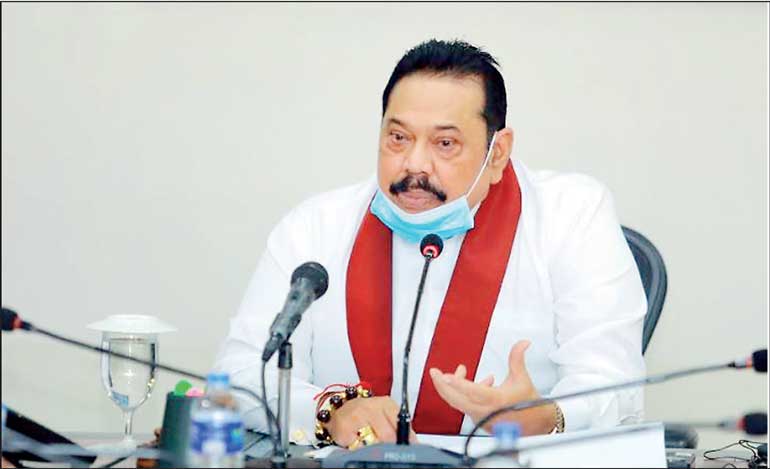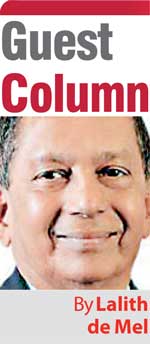Saturday Feb 07, 2026
Saturday Feb 07, 2026
Monday, 11 April 2022 01:00 - - {{hitsCtrl.values.hits}}

President Gotabaya Rajapaksa

Prime Minister Mahinda Rajapaksa
When a student at Cambridge University reading for the Tripos in Economics, I saw a statement attributed to Professor Pigou which said: “Economics is common sense, theoretical economics is common sense made difficult.”
Professor Pigou which said: “Economics is common sense, theoretical economics is common sense made difficult.”
I have always kept this at the back of my mind when writing anything connected to economics.
We have some major economic woes. We see little leadership from the President urging what needs to be done when looking through the common sense lens. The high priest of economics should be the Governor of the Central Bank. He is not an economist and we can forgive him his inability to articulate in high economic terms how we will get to all the good macroeconomic fundamentals. But what is the excuse for not following Prof. Pigou and telling us in common sense terms what needs to be done to solve our economic woes?
His contribution was to say we should not go the IMF without giving the reasons and then insisting on repaying a sovereign bond (instead of deferring payment) at a time of a desperate shortage of foreign exchange. As they were redeemed at face value there was a rumour that some individuals had large parcels of bonds bought at heavily discounted market prices and would make a killing when the bonds were redeemed at face value. So all we got from the Governor were two not very useful contributions.
A flurry of activity
The President, has woken up and taken a number of steps. To seek assistance from the IMF, to put the Governor’s advice of not to go to the IMF where it belongs (the waste paper basket) and to appoint two committees, one political and the other a collection of private sector leaders. The problems cannot be solved by waving a magic wand of private sector wisdom. There was no option but to go to the IMF, with its vast experience of helping countries in distress, and often called the lender of last resort. But the IMF is not a genial sugar daddy, prepared to give generous loans, to indulge countries that have been naughty boys, and got their economies in a mess.
The IMF
Judging by their approach elsewhere, we can have a pretty good idea of what they will do. They will seek to drive a country which is unstable towards economic stability by managing the macroeconomic indicators like the balance of payment, economic growth, inflation, unemployment, etc., and will push countries towards measures like low single digit inflation, fiscal deficits less than 3% of GDP, and a debt to GDP ratio of 40% or less. The policies that will affect these outcomes are the fiscal policy, monetary policy, and exchange rate policy, of a Government.
The problem with the IMF
They have bright economists and know what needs to be done to change and improve the economic profile of a country. Whether these remedies will hurt the people (when for example subsidies are removed) or damage the political fortunes of Governments, is not their concern. The challenge is to manage the process of meeting the IMF’s concerns, to obtain their financial assistance, and simultaneously to minimise the hardships on the people, when the IMF proposals are implemented. It can be done, and will narrate our experience when we went to the IMF during C.B.K.’s regime.
At the time as the senior Financial Adviser to the Ministry of Finance, I had a ringside view of proceedings. There was an extensive dialogue between the two sides on what needs to be done as per the IMF’s perspective, and what could be done from a Sri Lankan political perspective. Sri Lanka had the brilliant Economist P.B. Jayasundere the then Secretary to the Treasury who could comfortably match the IMF economists on debating the optional routes to get to the desired profile of macro-economic indicators. The equally brilliant back stop on our side was the then Governor of the Central Bank, the fine economist A.S. Jayawardene.
My role was to cultivate a relationship with the head of the IMF, and to persuade him to understand the socio-political realities in this country, which made it virtually impossible to implement some proposals, and to make him more willing to move towards the same economic ends through more palatable means.
We got their financial support, with manageable reforms to meet their recommendations. There is no reason why we cannot negotiate a sensible package, if we use a team of competent economists, including a governor who is an excellent economist.
The common sense approach
Our three main problems are shortage of funds for Government expenditure, inflation, and a desperate shortage of foreign exchange. The challenge is to master our rubik cube, with the many variables and to understand what created the current problems. Then, to take measures, that will provide relief, and to also take measures, that will ensure we do not go down the same hill again.
There are many options to address these problems. Herewith some thoughts:
No funds
Quite simply, it was because the Government was spending more than its revenue. They did this by borrowing from the Central Bank who printed the money required. Running the printing press causes another problem and that is inflation, due to “too much money chasing too few goods” as the classical economists put it.
1. The common sense solution is for the Government to take the red pencil and delete proposals for expenditure until we balance expenditure in line with income. The reason it has not happened is due to what I call CP (The curse of politicians).They were happy printing money.
Our politicians have not understood what Lord Keynes propounded as the multiplier theory a long time ago. If you give 100 as wages with borrowed money it will create a demand of 900 if people spent 90% and saved 10% (the 100 will result in 90 being spent which becomes somebody else’s income and that person will spend 81 and so on until the 100 creates a demand of 900). This is what creates inflation. The CP means that they will endeavour to continue doing things that will keep them in power, and to hell with what happens to the economy. That is the essence of CP.
2. The two common sense solutions are to stop all recruitment in the public sector. Cancel the current proposals of incremental military and defence expenditure and steadily reduce this expenditure.
3. To save local costs and foreign exchange, cancel/defer all proposed new projects. All projects will have a component of foreign exchange costs.
The port city’s promise of billions of investment did not happen. In the context of our economic problems no one is going to invest here when they can get all the same tax and other concessions in a multitude of countries with no economic problems that offer tax free havens.
4. Stop all road projects (now a major expense).
5. We cannot repay our loans when due. The only option is to restructure our debt, and to make it a credible process should be done with the help and advice of the IMF.
6. Increasing revenue
Increase income tax with a top rate of 40%. Increase corporate tax by 10%. Selectively increase VAT protecting the less well to do.
7. Foreign exchange
We earn foreign exchange primarily from exports and Tourism. Provide all support for exports by removing blocks and hindrances in processes.
Tourism is our gold mine. Pre-COVID Thailand had 39 million, Malaysia 26 million and Sri Lanka 2 million. Enormous potential and tourism is what will save the country. It is the most viable option to create a long term solution for our foreign exchange problems. Over a very long period the development of tourism has been hampered by the megalomania of ministry officials and those appointed by the minister wanting to control tourism. There is a whiff of a smell of megalomania in the air again .It must be ruthlessly extinguished.
Tourism is a private sector activity, all the way right through from big hotels to grass roots tourism activity. Many top corporates in the country are in tourism. They have an abundance of fine talent and the private sector must be given the space to run this industry. It has been hindered for years by tin pot megalomaniacs wanting to control what is way beyond their competence.
The President must ensure that the private sector is not impeded by politicians or persons appointed by him and is protected from those wanting through various means like new Acts to stick their fingers into the tourism pie.
If a new act is required it must be left to the private sector to put it together.
8. The role of the State is to provide the infrastructure to support tourism.
9. Educating the public
It is important to educate the people so that they will understand what created our current problems. This is essential to get their support for what needs to be done to wade our way out of the current mess.
Arguably the prime cause was our mega infrastructure projects. They impacted the revenue available to the Government. They caused a drain of our foreign exchange. When sponsors gave us loans to finance projects sponsored by them it added to our debt.
The private sector must sponsor a project to create widespread understanding in the country of the impact of these projects.
For each project they should publish, the total cost, the rupee component, the foreign exchange component that went out of the country and the amount of debt created to fund the project.
Any project must have a payback period ideally around five years. These mega projects had a very poor payback. To illustrate this the annual income required from these projects to get a payback in five years should be listed. Then it will they become obvious these projects had a never, never payback.
This information should be provided for all the different parts of the Southern Highway; Mattala Airport; Suriyawewa cricket ground; Hambantota Port; Port City and Kandy Highway.
Getting out of the economic mess
Common sense tells us what caused our problems and common sense shows us the way forward. The one thing that may prevent us going down the sensible common sense route is the selfish interests of politicians.